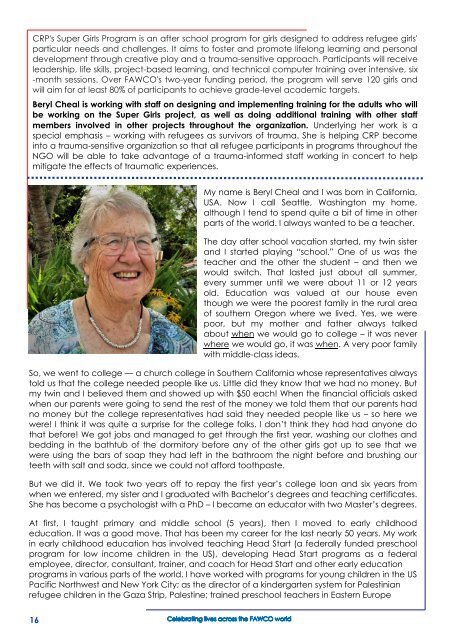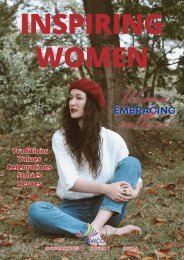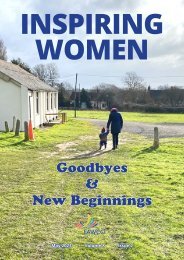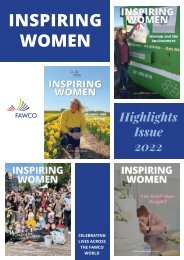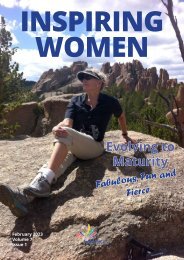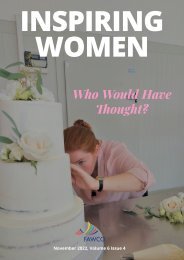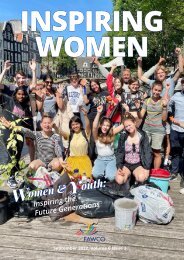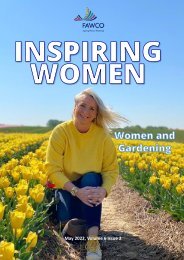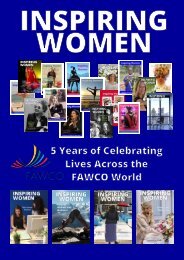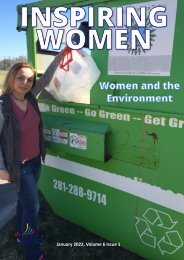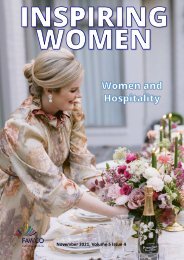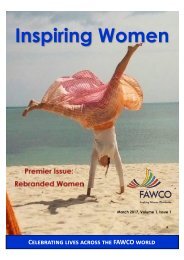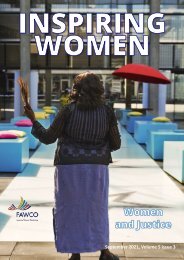Inspiring Women Fall 2017
Create successful ePaper yourself
Turn your PDF publications into a flip-book with our unique Google optimized e-Paper software.
CRP's Super Girls Program is an after school program for girls designed to address refugee girls'<br />
particular needs and challenges. It aims to foster and promote lifelong learning and personal<br />
development through creative play and a trauma-sensitive approach. Participants will receive<br />
leadership, life skills, project-based learning, and technical computer training over intensive, six<br />
-month sessions. Over FAWCO's two-year funding period, the program will serve 120 girls and<br />
will aim for at least 80% of participants to achieve grade-level academic targets.<br />
Beryl Cheal is working with staff on designing and implementing training for the adults who will<br />
be working on the Super Girls project, as well as doing additional training with other staff<br />
members involved in other projects throughout the organization. Underlying her work is a<br />
special emphasis – working with refugees as survivors of trauma. She is helping CRP become<br />
into a trauma-sensitive organization so that all refugee participants in programs throughout the<br />
NGO will be able to take advantage of a trauma-informed staff working in concert to help<br />
mitigate the effects of traumatic experiences.<br />
My name is Beryl Cheal and I was born in California,<br />
USA. Now I call Seattle, Washington my home,<br />
although I tend to spend quite a bit of time in other<br />
parts of the world. I always wanted to be a teacher.<br />
The day after school vacation started, my twin sister<br />
and I started playing “school.” One of us was the<br />
teacher and the other the student – and then we<br />
would switch. That lasted just about all summer,<br />
every summer until we were about 11 or 12 years<br />
old. Education was valued at our house even<br />
though we were the poorest family in the rural area<br />
of southern Oregon where we lived. Yes, we were<br />
poor, but my mother and father always talked<br />
about when we would go to college – it was never<br />
where we would go, it was when. A very poor family<br />
with middle-class ideas.<br />
So, we went to college — a church college in Southern California whose representatives always<br />
told us that the college needed people like us. Little did they know that we had no money. But<br />
my twin and I believed them and showed up with $50 each! When the financial officials asked<br />
when our parents were going to send the rest of the money we told them that our parents had<br />
no money but the college representatives had said they needed people like us – so here we<br />
were! I think it was quite a surprise for the college folks. I don’t think they had had anyone do<br />
that before! We got jobs and managed to get through the first year, washing our clothes and<br />
bedding in the bathtub of the dormitory before any of the other girls got up to see that we<br />
were using the bars of soap they had left in the bathroom the night before and brushing our<br />
teeth with salt and soda, since we could not afford toothpaste.<br />
But we did it. We took two years off to repay the first year’s college loan and six years from<br />
when we entered, my sister and I graduated with Bachelor’s degrees and teaching certificates.<br />
She has become a psychologist with a PhD – I became an educator with two Master’s degrees.<br />
At first, I taught primary and middle school (5 years), then I moved to early childhood<br />
education. It was a good move. That has been my career for the last nearly 50 years. My work<br />
in early childhood education has involved teaching Head Start (a federally funded preschool<br />
program for low income children in the US), developing Head Start programs as a federal<br />
employee, director, consultant, trainer, and coach for Head Start and other early education<br />
programs in various parts of the world. I have worked with programs for young children in the US<br />
Pacific Northwest and New York City; as the director of a kindergarten system for Palestinian<br />
refugee children in the Gaza Strip, Palestine; trained preschool teachers in Eastern Europe<br />
16


